In this Article:
I have always had an attraction to snub-nosed revolvers. I’ve owned a few, including a Charter Arms .44 Special Bulldog back in the late ’70s when David Berkowitz used that gun for nefarious purposes in New York. The large-ish Bulldog stretched the definition of a snubby, but technically it fit.
It had quite a reputation then, not all good. But, the gun itself was simply a tool used by a madman to perform his executions — I used mine for more peaceful purposes, like shooting wax bullets powered by primers only on an improvised indoor range. In this review, we’ll talk about the Taurus 85 Ultralite. It’s appearance, specs, and shooting performance. Now, let’s begin.
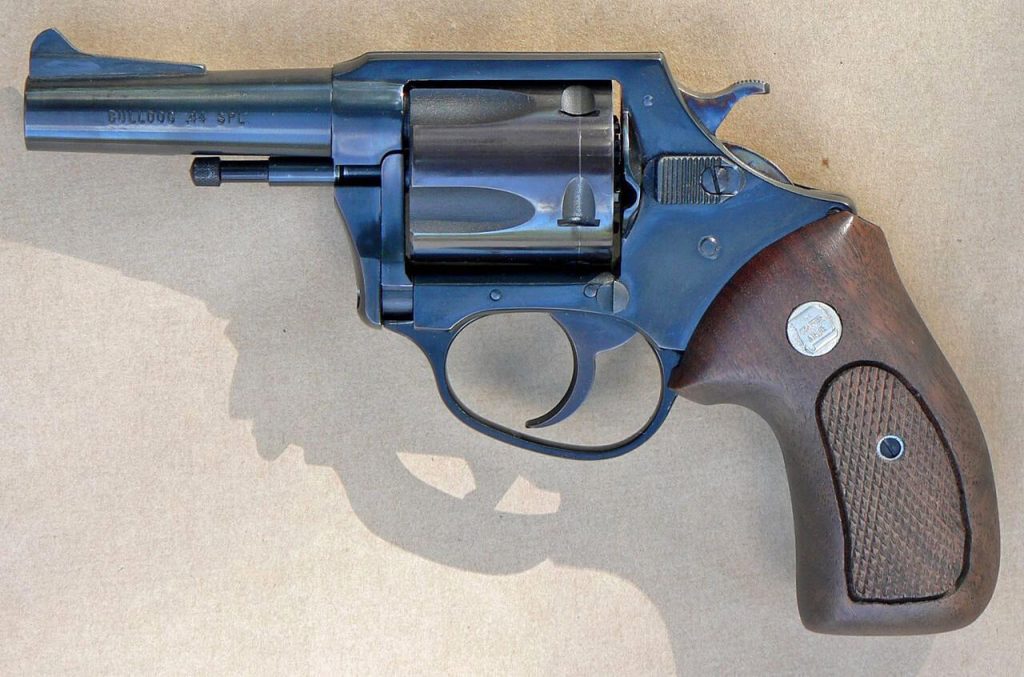
I shot that gun a lot and carried it even more. The only thing I didn’t like was its unsupported ejector rod. It was out there all by itself without an underlug to fit into. That was the only disadvantage about that gun. One time, I also owned a Charter Arms Undercover .38 Special snubby. Charter Arms is a name to be reckoned with in terms of heavy-caliber snub-nosed guns.
I graduated, a little later, into owning a Colt Detective Special — the newer one with the very cool underlug barrel and full walnut grips. Being an aluminum-framed beauty, it was very light. Colt’s famous 6-shot cylinder went backward when compared to an S&W, it was one of the gun’s outstanding features.
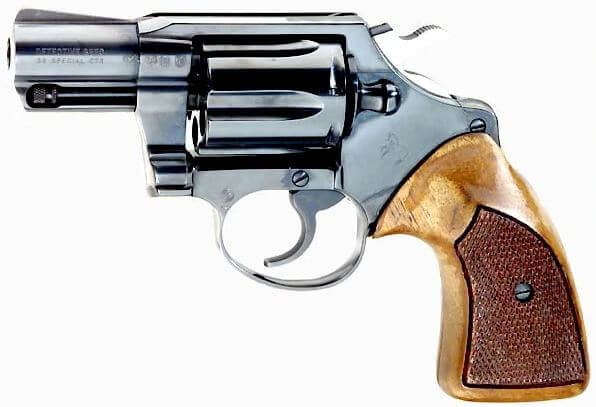
Taurus 85 Ultralite Specs
Now, let’s take a little closer look at this gun.
| Weight | 17.0 oz |
| Caliber | .38 Special +P |
| Length | 6.5" |
| Height | 4.3" |
| Width | 1.34" |
| Barrel Length | 2.0" |
| Capacity | 5 rounds |
| Trigger | DA/SA |
| Frame | Aluminum alloy |
| Finish | Matte black anodized |
| Grip | Textured rubber |
| Sights | Fixed |
| Rifling | Right-hand with 6 grooves |
| Rifling Twist | 1 in 16" |
(The Model 85 has been discontinued in favor of the 6-shot 856. The 85 is still available as new, in stores and online).
BONUS OFFER: Get your free shooting range targets to print at home!
Get your free targets to print at home!
Now for a little deeper dive.
Taurus 85 Ultralite Grip
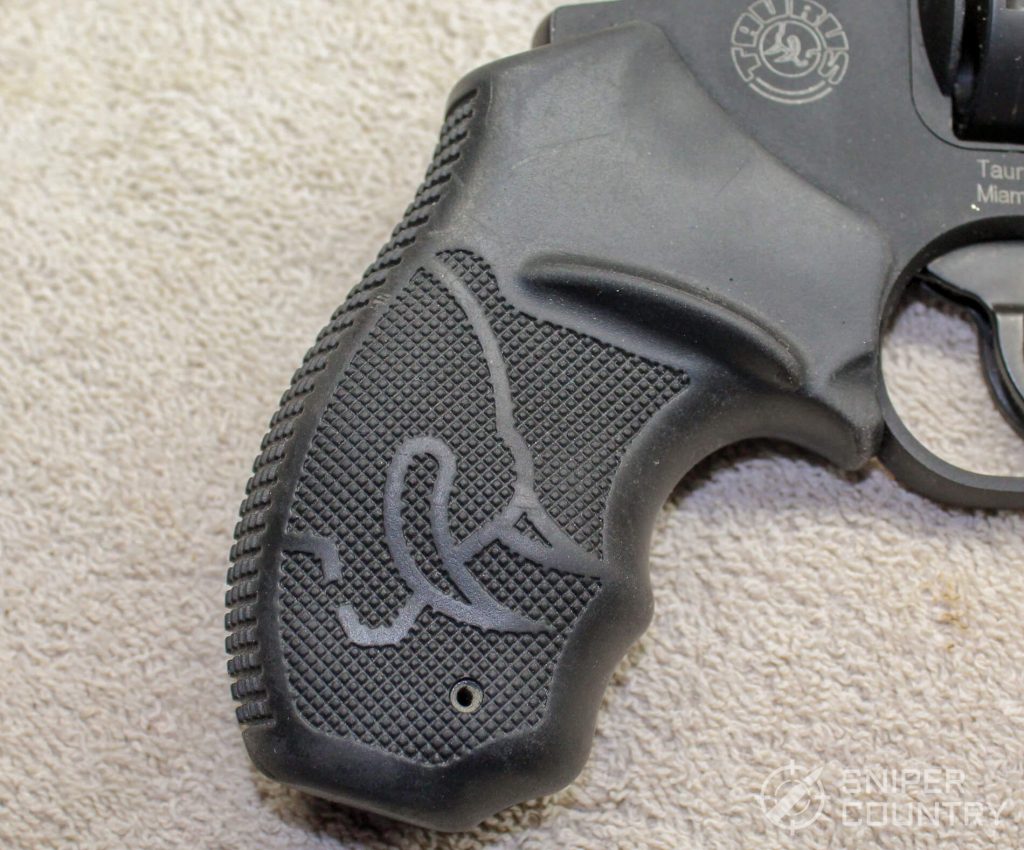
A snubby’s grip is the only interface it has with your hand. So if it doesn’t fit well, then you should replace it. The rubber grip on this snubby is excellent. I’ve owned the whole gamut — hand-carved walnut grips that I made to top-notch wraparound composites.
This grip was well thought out. It has a subtle palm swell on either side with a thumb shelf so it doesn’t matter whether you are right-or left-handed, it fits either way.
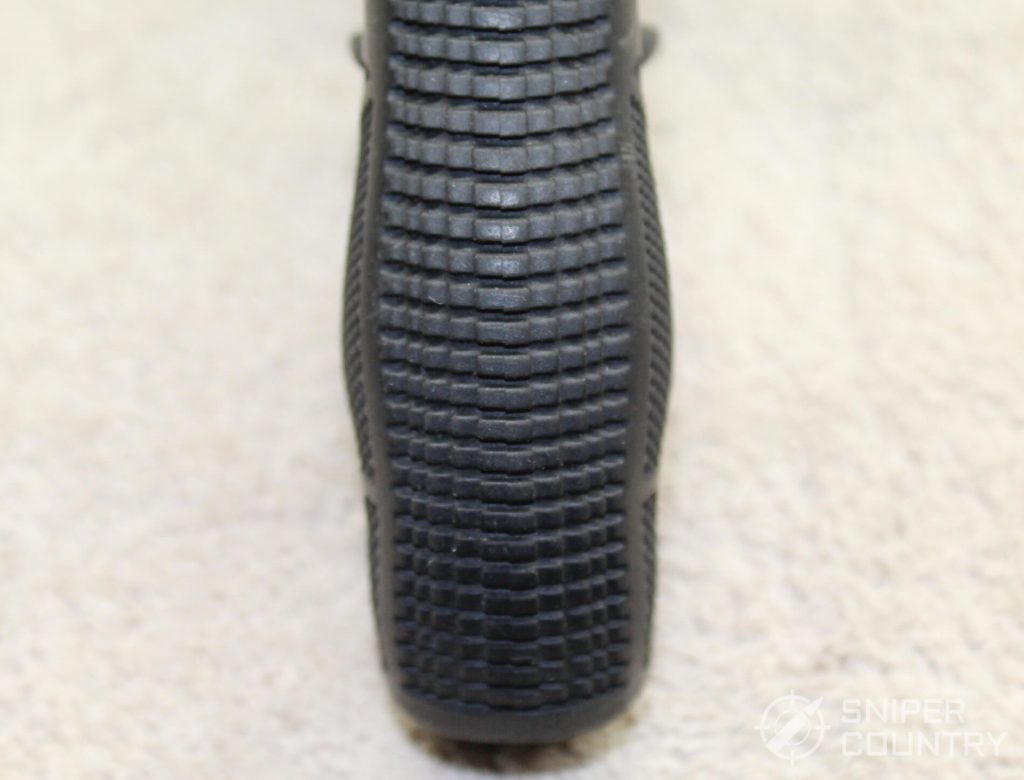
This is not a two-finger nor three-finger grip, but a 2 1/2-finger grip. There’s a small finger groove for your second and third fingers, but there is also a tiny little notch at the bottom to give your pinky somewhere to land. You can’t get three full fingers on it but at least your pinky isn’t left dangling out there.
The grip is also pretty good at doing its other main job, which is soaking up recoil. A +P-level .38 Special round can generate a decent amount of recoil in a 17-ounce snub-nosed revolver and these grips soak it up pretty well.
Taurus 85 Ultralite Cylinder Lock-Up
The next item is something that some companies (including Taurus) sometimes includes on their revolvers that are chambered for higher-pressure loads. I’m talking about a forward cylinder yoke locking stud. Here are two photos, one of the locking stud and another of the slot it snaps into.
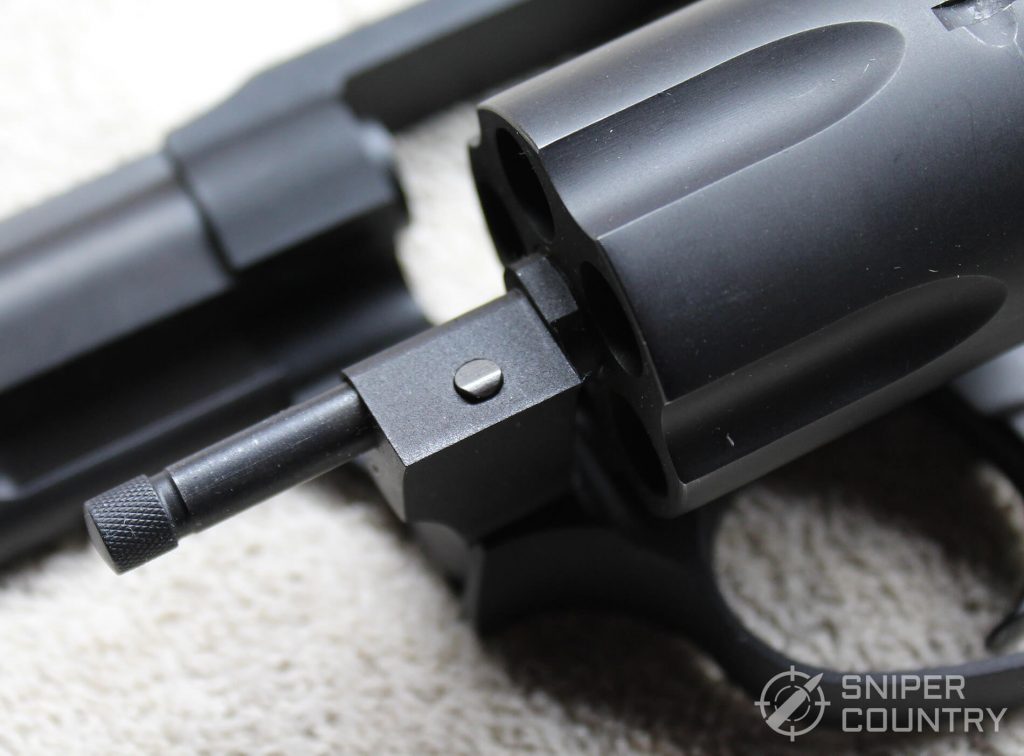
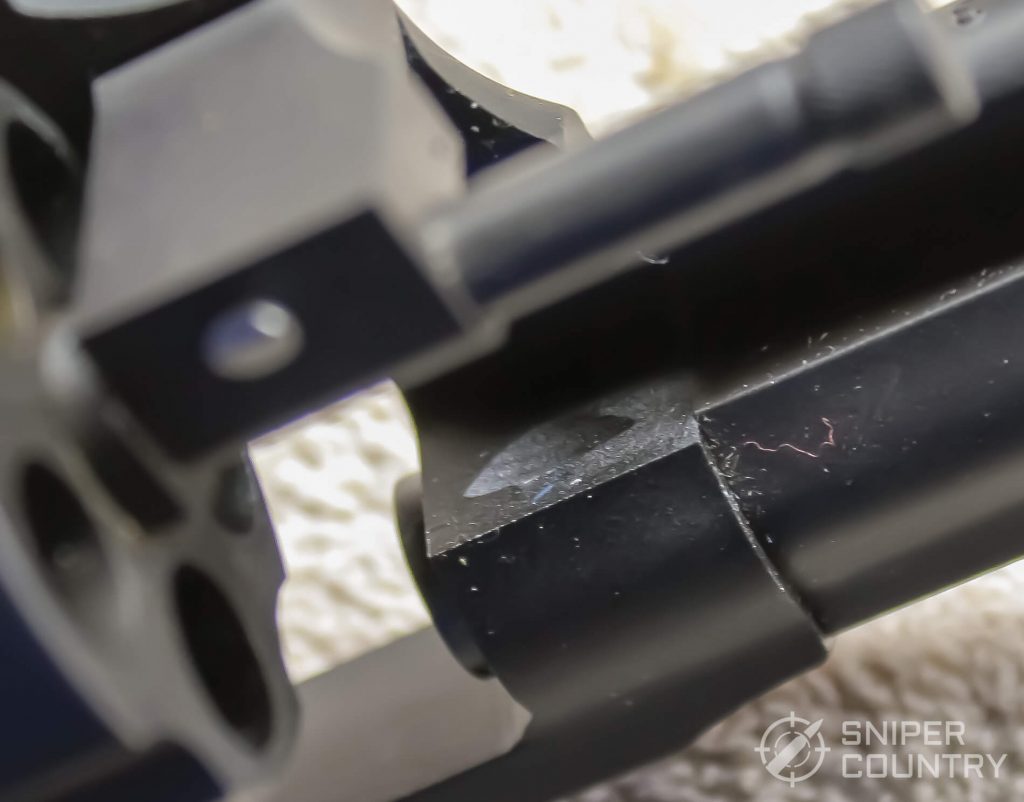
The 85UL has the usual rear-positioned latch release but it also includes a spring-loaded stud on the top of the yoke that snaps into a recessed slot on the frame.
A revolver rated for +P ammo should have a very secure cylinder lock-up. Even though there’s no separate thumb release on the yoke, at least the cylinder locks there. And, to look at another form of lock-up, the cylinder locks up very tightly when the hammer is cocked, again a good thing.
There should be no “pitting of lead or jacket material. The cylinder is also long enough for some of the longer cast bullets out there. And it had no trouble with my 160-grain Lee semi-wadcutter.
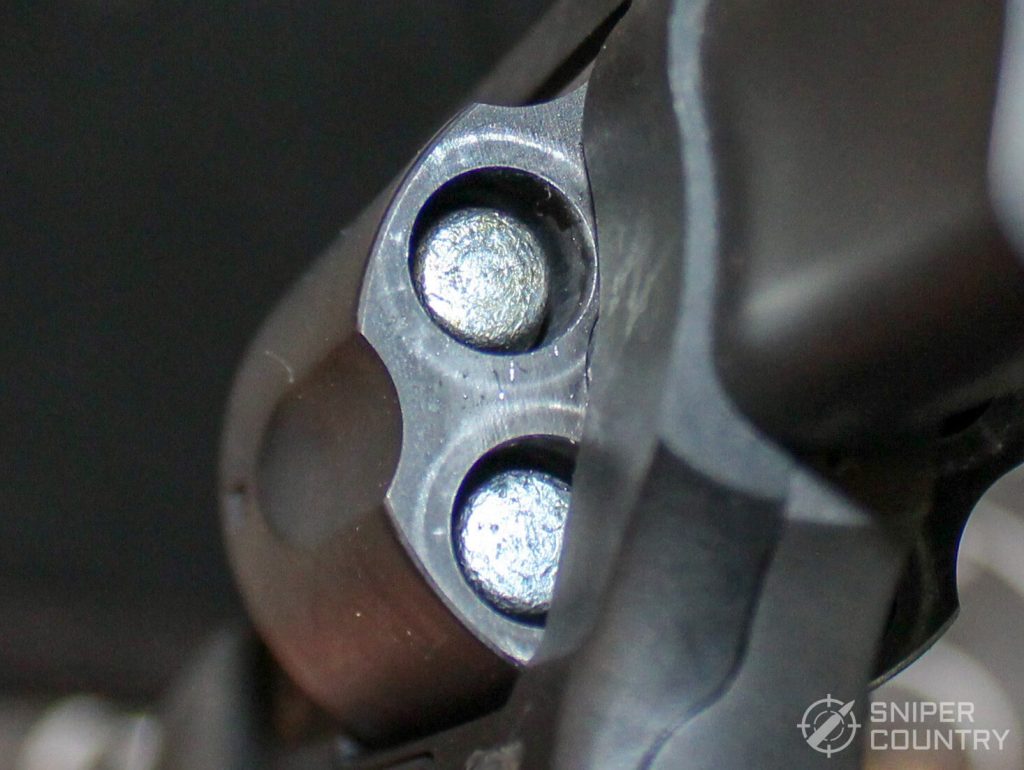
Popular Articles
Taurus 85 Ultralite Trigger
The trigger on my 85UL is very nice. I would guess the pull weights to be around 9 pounds DA and probably 4.5 in single action mode. To be sure, the pull weights are not as nice as those on my S&W 638, but as someone on YouTube commented about S&W’s snubby triggers, they’ve been making these little guns forever so they have the trigger down pat.
I’ve used my share of revolvers with grooves machined into the trigger face, but this one is smooth. On a target gun, grooves are fine but on a concealed carry gun, I like a smooth trigger face. You never know if you’ll have to transition from a normal double-action to a single-action pull, and a smooth trigger facilitates that.
Also, the edges of the trigger are not too sharp. I don’t remember how many handguns in general I’ve owned where I had to take the sharp edges off the edges of the trigger. This is not a place for a knife-edge-like machining job. I don’t know if I could explain why I like triggers on CC guns to be this way — I just do. It works for me, but you may be different. If so, let us hear from you below.
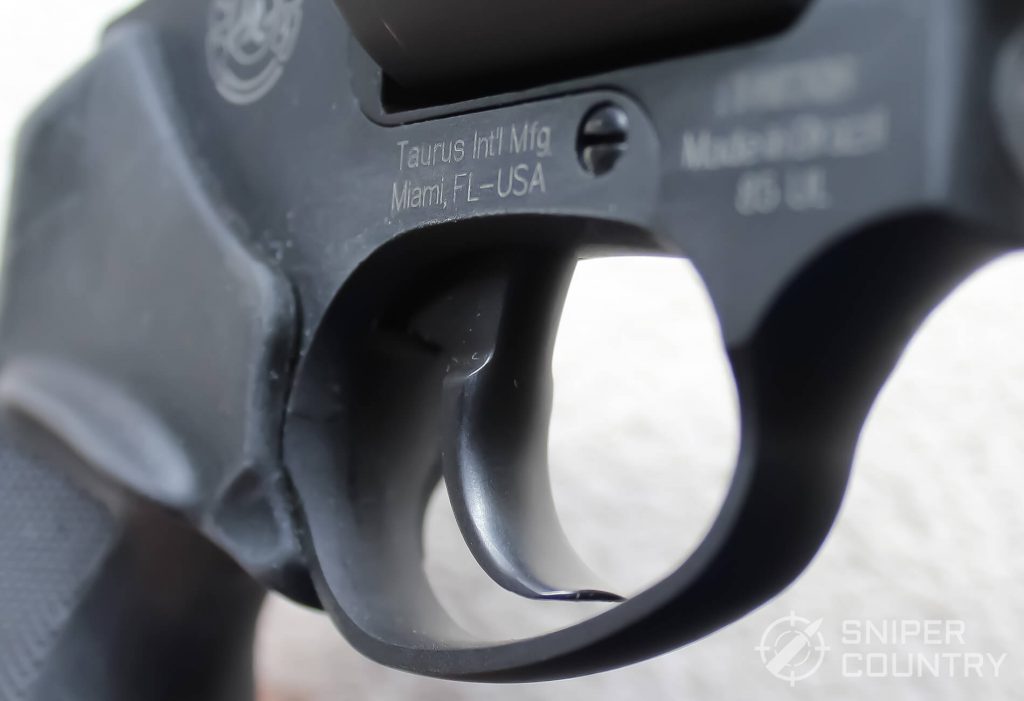
Taurus has made its fair share of wheel guns, and they seem to know what they’re doing. On a snubby, it’s best to have a trigger pull that’s smooth, without catches. Pull weight is secondary unless it’s a Colt 1917 .45 ACP.
Of course, a lighter pull is better than something that would take Hulk Hogan to pull. But if the pull is smooth and breaks cleanly every time, that helps to make up for a heavier pull. I noticed on mine that the pull is even in double-action mode. The single-action pull is great. It’s very clean with hardly any creep. There is no take-up and darned little overtravel.
By the way, if you aren’t familiar with trigger terminology, here’s a quick tutorial.
- Take-Upis the distance you have to pull the trigger before you feel it engage the sear. Sort of like freewheeling on a bicycle — no resistance. It just takes extra time, and more concentration to hold the sights on the target.
- Creepis what you feel after the trigger engages the sear, before it breaks. Creep can be pain or not — it depends on how smoothly the engaging parts have been polished. You may want a little amount of creep, but not too much. Everybody’s different in what works for them. Having to put pressure on the trigger for a seemingly-long time before the gun fires can move your sights off-target.
- Overtravelis how far the trigger moves after the shot breaks. Some pistols have overtravel stops, either in the trigger itself as an adjustment screw (think higher-end 1911) or molded onto the frame of a polymer pistol. You don’t want the trigger to move much after the shot breaks.
The trigger that came in this gun is fine for that role and is good enough that it allows for some fairly sophisticated trigger control. Train with it in double-action mode for the majority of your range time, and then cock the hammer and explore the single-action mode. You’ll get good at double-action center-hits in short order. At least, that’s the goal. Learn to control the trigger and then see how it helps your shooting.
Taurus 85 Ultralite Sights
The sights are a trough down the middle of the top strap with a fixed post up front. I usually paint my handgun sights to make them more visible to my aging eyes. I will daub some brightly-colored nail polish on the front post, with the rear outlined with a white paint marker.
So, how can a company mess up such a simple set-up? I’ve seen some snubbies (mostly older models) that used a very small, thin front post coupled with a shallow rear notch. This type of setup makes it hard to place the front post on target and simultaneously keep it centered in the rear notch due to the small size of the post and shallowness of the notch.
The Taurus 85UL has a set of usable sights. The notch is deep and square, with a matching-size front post. It’s easy to get a good sight picture with these sights.
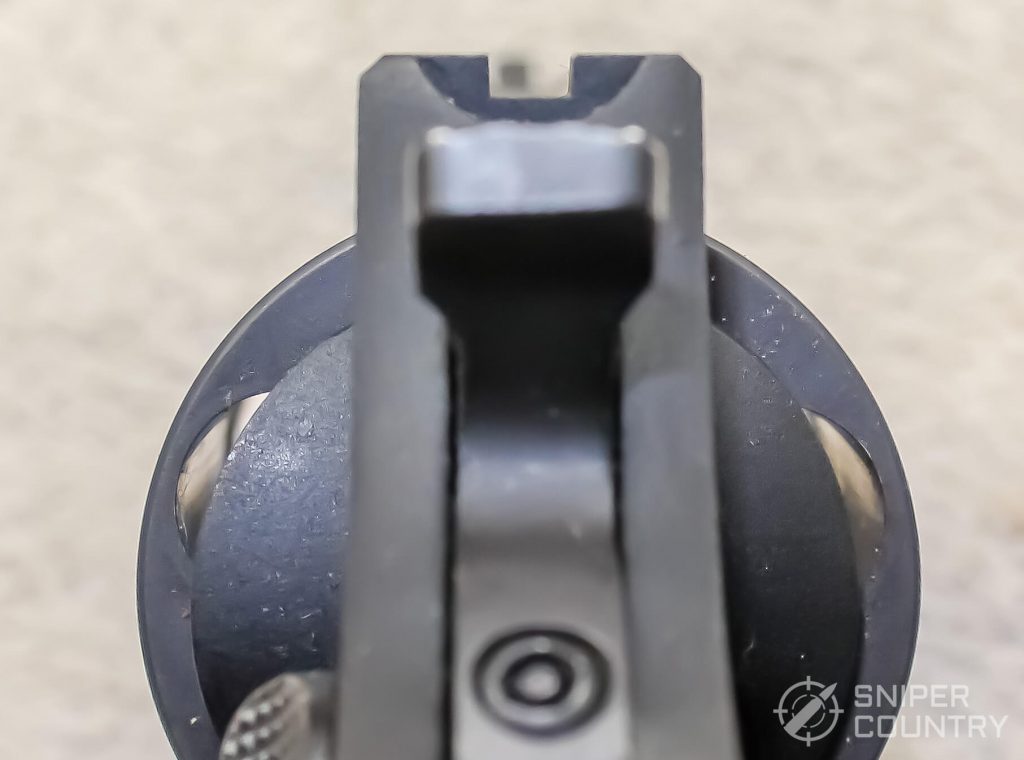
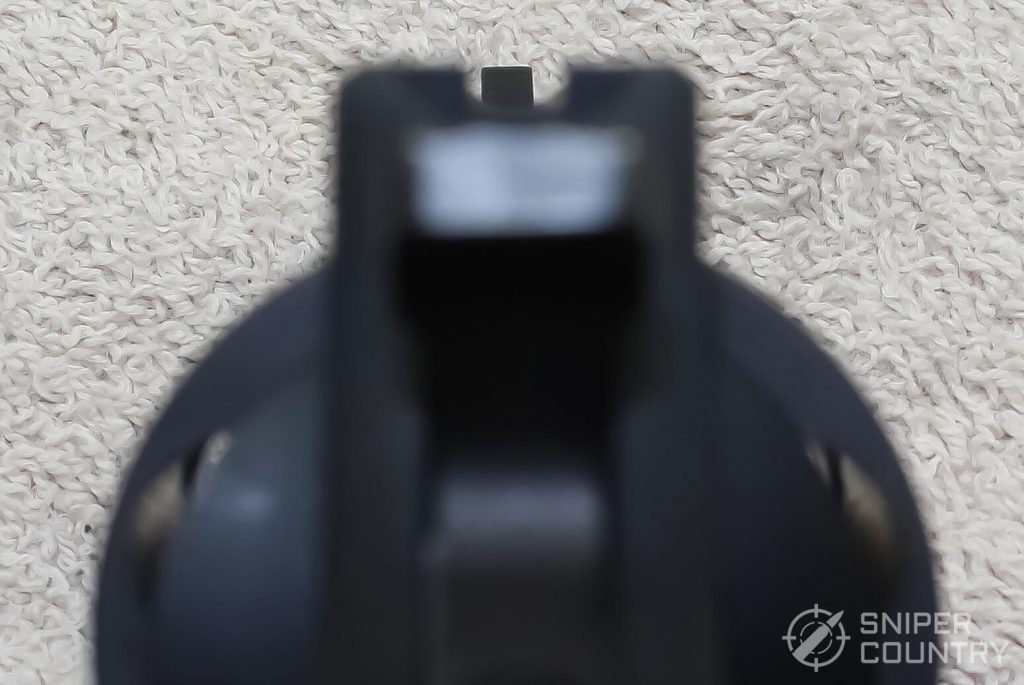
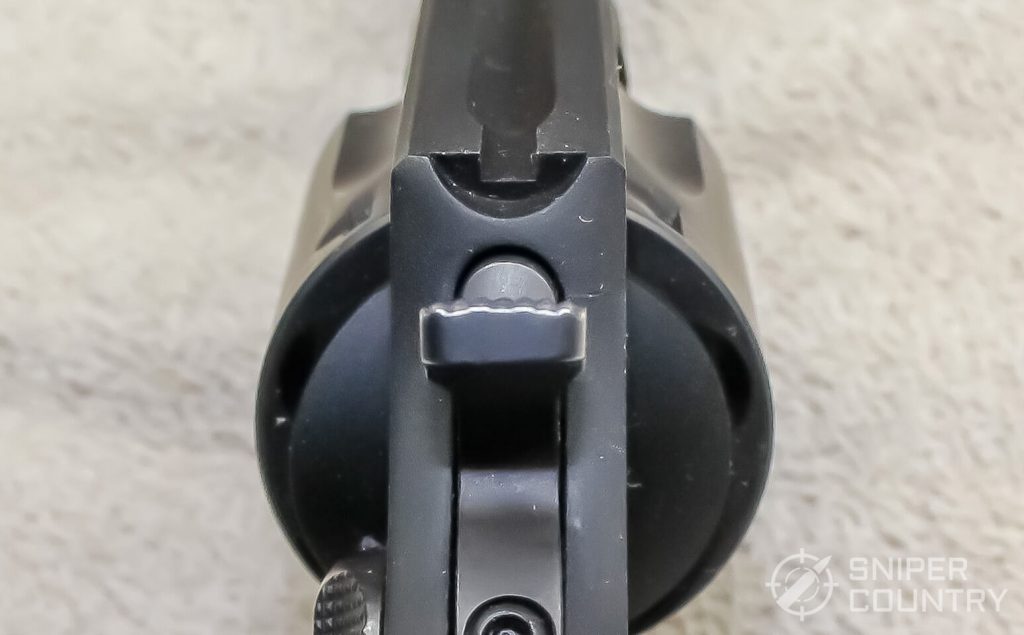
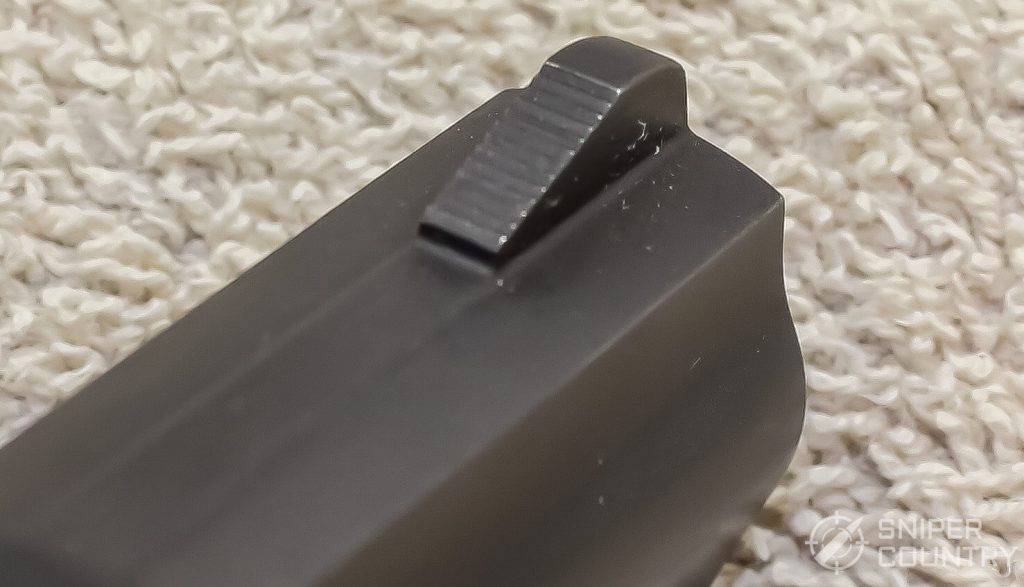
Taurus 85 Ultralite Finish
When we talk of a snubby that is designed to be carried very close to the body, we think of the abuse that the gun will undergo in terms of rubbing against you or your clothes, dings and scratches, and other unpleasant events.
I think probably the best overall finish wouldn’t be a finish, but a metal — stainless steel. It is fairly impervious to sweat (it will still rust, it just takes longer) and allows you to buff out a minor scratch without needing to re-blue it with a cold blue touch-up. But, it does tend to cost more most of the time.
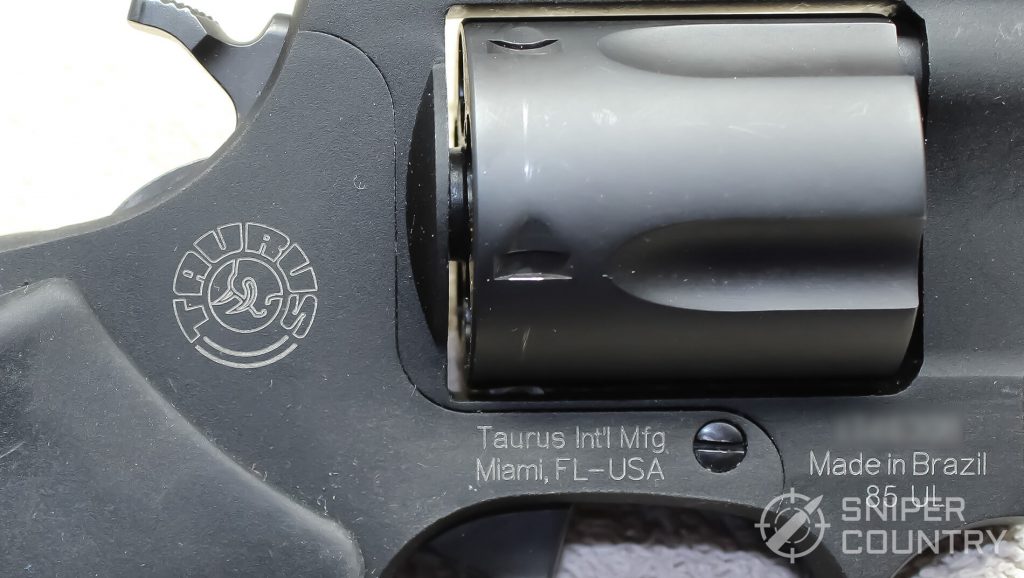
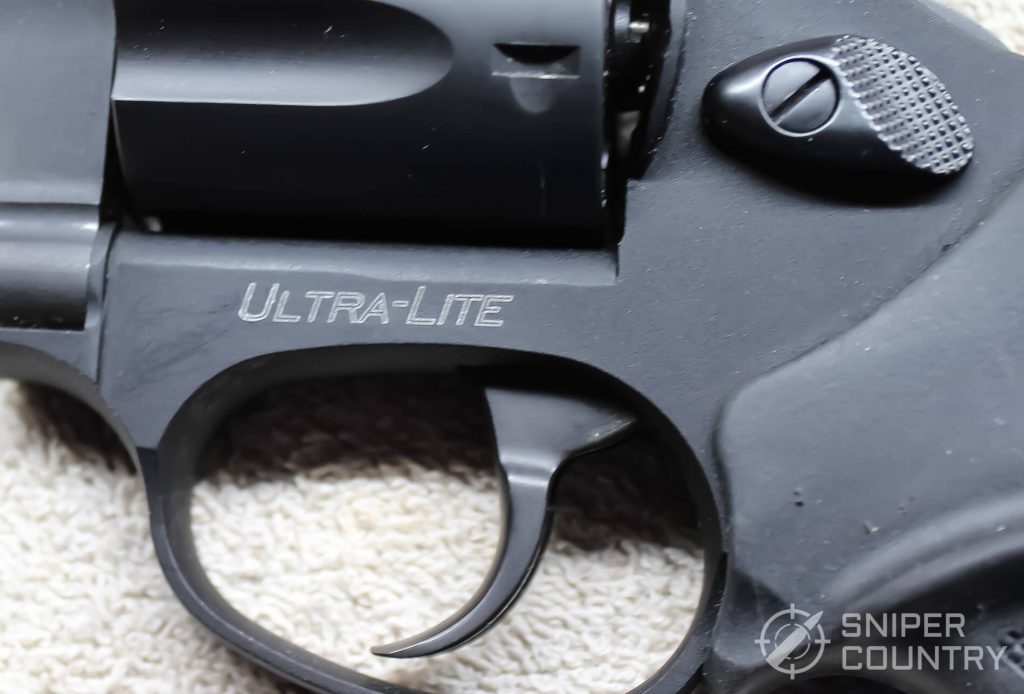
My 85 UL has a flat matte black finish. I’m not exactly sure how it was applied to the aluminum frame — whether by a bluing process or anodizing, but it looks like a very dark blue that hasn’t been polished. Taurus has gotten away from bright, shiny bluing, and they are cutting corners where possible. Their revolvers tend to be either stainless or black. There’s nothing wrong with this — it’s just different.
I guess the main purpose of a finish is to protect the gun from rust or other surface blemishes, and this finish does that. I once owned a Rossi .357 that had, literally, a mirror-polished stainless finish that you could see yourself in. That was all well and good, but it didn’t last. The more I shot and cleaned it, the less bright the finish became. I liked that shininess then, but I’ve come around more to liking a more-utilitarian coating on my guns. As long as the finish holds up, I’m good with it. Time will tell.
One thing that is obvious in the photos above is that the anodized aluminum frame’s finish is rougher than the steel parts’ (cylinder, cylinder release, hammer and trigger) blued finish.
BONUS OFFER: Get your free shooting range targets to print at home!
Get your free targets to print at home!
Taurus 85 Ultralite, Other Goodies: Grips, Holsters and More
Now, before we shoot this thing, let’s look at the accessories available for this Taurus snubby.
Suppose you didn’t like the grips that come on this gun, Taurus sells replacement grips.
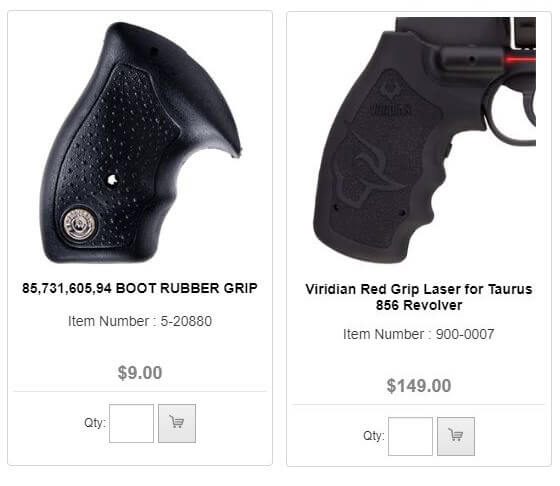
(Remember, the 856 is the 6-shot revolver that replaced the 85. Grips will fit both).
If you don’t like the Taurus offerings, there are always Hogue, Pachmayr and others. In terms of adding a laser, if you don’t want to go with the grip above, I put a LaserLyte on my S&W 638 — the same one fits a Taurus 85/856.
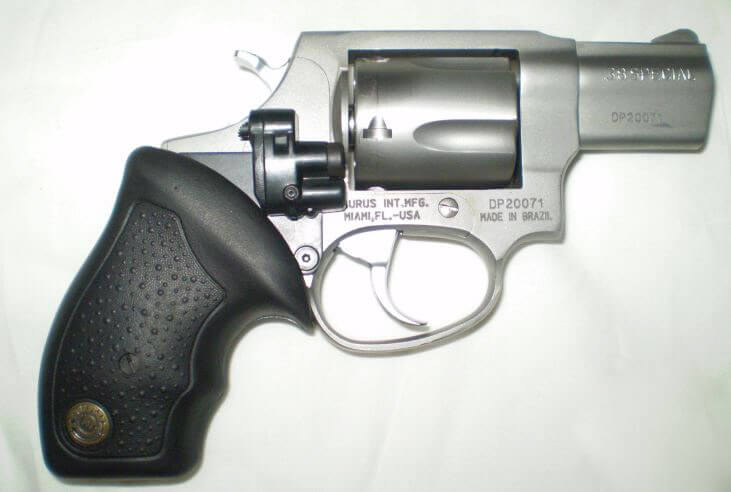
Here it is on a stainless 85. I recommend LaserLyte for two simple reasons: they usually work as advertised, but if they don’t, they have excellent customer service.
I purchased one, used, from a gun dealer friend for an unbelievably small amount of money. I stuck it on my 638 and discovered the windage adjustments I made weren’t holding. Long story short, the company sent me a brand new one, no charge, no questions asked. That is excellent customer service.
The laser works with either hand shooting the gun. It also won’t get hung up in most holsters made for this gun.
In terms of other parts like the speedloaders, holsters, etc., check out Brownells and Midway USA. For more in-depth parts like barrels, cylinders, etc, go to Numrich Corporation. Any of these companies should have anything your heart desires for your 85, and increasingly so, for your 856.
Shooting the Taurus 85 Ultralite
With the grip the gun wears, recoil is mitigated by a decent amount. I tested the gun with my standard .38 Special load — my hard-cast Lee 160-grain semi-wadcutter over 3.5 grains of Titegroup. This load shoots at 796 fps with 225 ft./lbs. of energy out of my 1.87-inch-barreled S&W 638.
It shoots, fairly accurately, to point of aim at 15 yards, so this is a great practice load. It does even better out of the Taurus 85 with 848 fps with 256 ft./lbs. of energy. I usually don’t carry handloads, though, as too many things can go wrong. Factory ammo is great, and the newer .38 defense loads are much better than those in years gone by.
Even so, some of the best fight-stoppers are semi-wadcutters at a get-up-and-stomp-them velocity. But, legally, factory ammo is the way to go. (To read about the .38 Special’s lineage, check out my article here). You can see a sample target at the top of this piece. It shot a little high at 7 yards, but that’s to be expected with that load. At least it was centered and fairly accurate. I shot a mixture of double-action and single-action shots.
Taurus 85 Ultralite Wrap Up
The Model 85 (856) is one tough snubby, built to take a steady diet of +P loads without bending anything. If you are looking for a no-nonsense, pull-the-trigger-and-it-fires carry gun, give this gun a second look. With the 85 being discontinued, that means that a lot of dealers who have them in stock may be wanting to move them quickly. This usually translates into selling them at a bargain-basement price. This is a win-win. The dealer moves merchandise and you get a heck of a gun for not a heck of a lot of money. If you just have to have that 6th round, pick up an 856. With the pricing structure that Taurus is currently embracing, you will still get a good deal.
Give a Model 85 a look — I don’t think you’d regret it. As always, leave a comment below if you have had any experience with this snubby. Now, get out, go shoot, and stay safe.
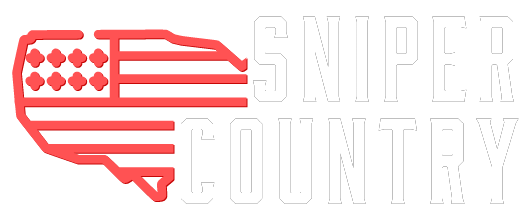
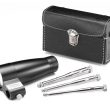
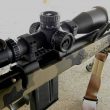
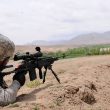
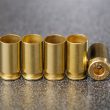
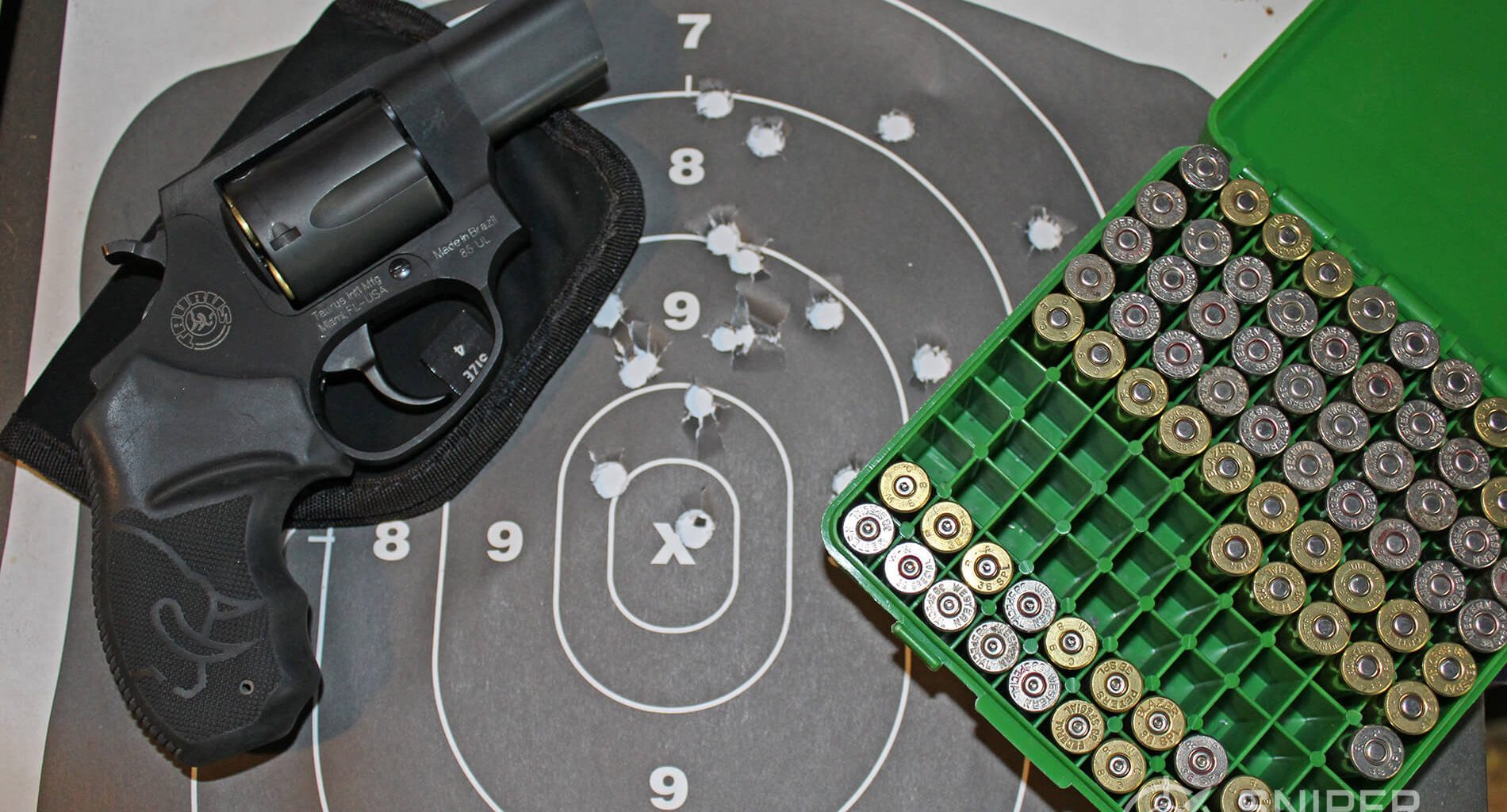
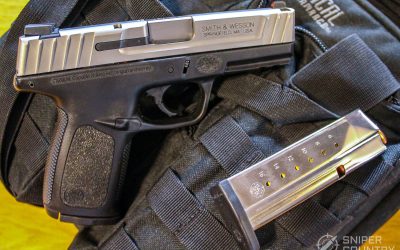

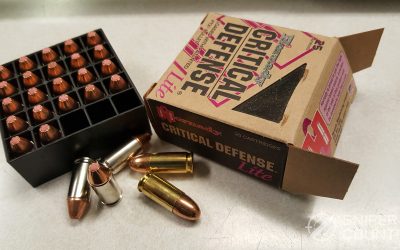
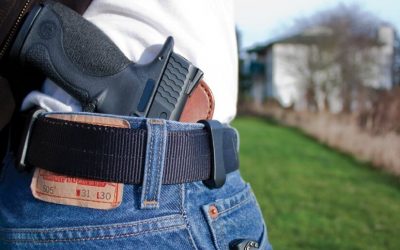
![9mm Glock Models [Ultimate Guide]](https://www.snipercountry.com/wp-content/uploads/2018/10/Glock-17-vs-Glock-19-vs-Glock-26-vs-Glock-41-vs-Glock-43-WM-400x250.jpg)
![Handgun Calibers [Ultimate Guide]](https://www.snipercountry.com/wp-content/uploads/2018/10/Handgun-Caliber-Comparison-400x250.jpg)
![Rifle Calibers [Ultimate Guide]](https://www.snipercountry.com/wp-content/uploads/2018/12/Header-1900-400x250.jpg)
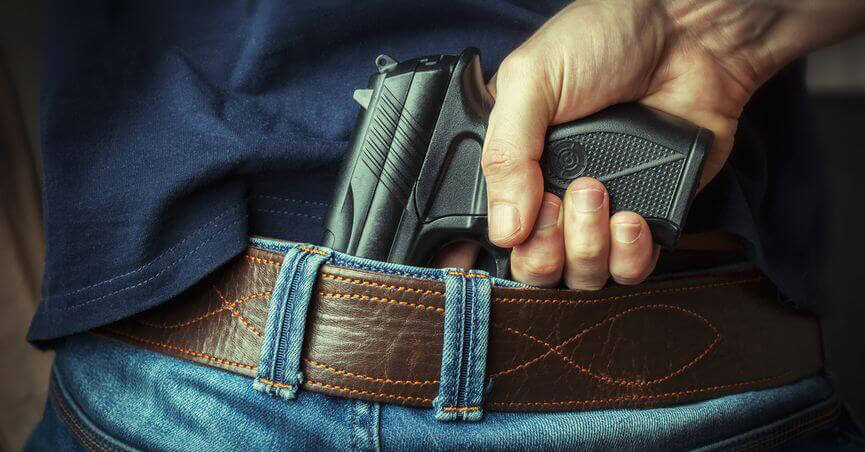
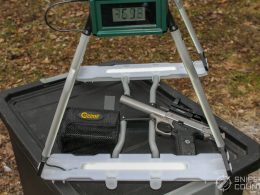
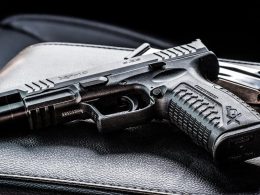
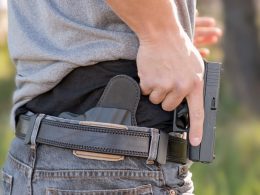
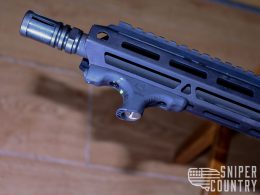
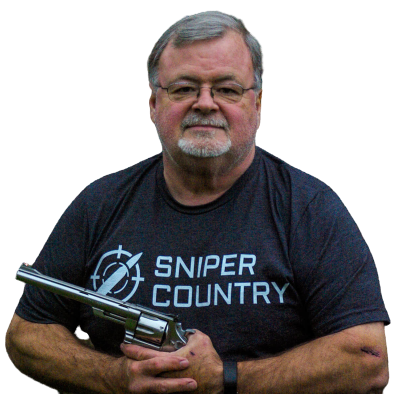
My wife carries this little snubbie. It has the flat stainless finish on it, and she LOVES this revolver!!!
Samuel, good choice. I wanted stainless but he had the black. Thanks for writing!
Thank you, Mike for that lengthy but informative review. As always, you have managed to grab this reader’s attention and has helped me make an informed decision. I have been looking for a snubby for awhile and I just can’t seem to decide on which one to get. S&W, Ruger, Charter, now Taurus. The list goes on. I am going to seriously take a look at this and if it is being offered as a rental, I will most certainly give it a whirl.
Francis, I think you could do worse. As I said above, I own a S&W, but like this one at least as much as I do that one. The extra cylinder lock-up makes it one to reckon with. Thanks for writing!
Wonderful article! Really informative and thorough, while also remaining candid and entertaining. All this made for a great read.
I too have recommended this line of Taurus snubbies to friends and colleagues many times. In fact, I own one myself and even purchased a second for my senior mother. – They make for great CC or nightstand guns for someone who hasn’t owned many (or any) pistols before.
Also, I couldn’t agree more about the grip. I also own the S&W model you mentioned in your article, and I actually prefer the feel of the Taurus in my hand. I actually had never heard of the ‘2 1/2 finger’ grip as you mentioned, but after taking a second look at my Taurus myself, I do believe that’s one of the reasons that makes it so good. It really does make for a great fit in the hand.
Thanks again for the write up!
David, thanks for the compliment…I appreciate it! I try to be helpful. Thanks for writing!
Excellent review as always! If you’re interested take a look in this pictures from XX century brazilian arms factories, let’s say they inspired taurus company!
https://armasonline.org/armas-on-line/antigas-fabricas-de-armas-no-brasil/
Pastor, I checked the link – very interesting! It looks like S&W had its influence, too…especially with the “Tigre” revolvers. Look to be a really close copy. Thanks for writing again.
That’s right my friend! There is a lot of old S&W in here, I have a S&W top break revolver in 32 short more than 60 years old! Fun fact those old top brake revolvers are called in here as “little colt” kkkkkk
Sounds like you have some fun guns! Thanks for writing again.
Mike will using steel case 130gr. FMJ 38 special damage the Taurus – S&W or my pink lady charter arms 38 special – I’m looking at a 38 special airweight – I’ve been told they handle the steel case ammo better – will look at the Taurus if you think it would do steel case – the brass case is hard to find is why I am asking- thank you for sharing your knowledge/experience I’m just starting with my hand gun experience and need all the professional information I can get – finding non-professional confusing so thanks again for sharing to help me find the rite gun for me – K
Kay, I have no experience with steel-cased .38 ammo, but I don’t see why you couldn’t use it in your revolvers. The issue with steel cased ammo is usually when it’s used in an autoloader – some are very picky where those guns concerned, having extraction or feed issues. Revolvers don’t have those problems. I would say buy a box, load a cylinder and shoot it. First, check to make sure there are no split cases when you kick the empties out, and then just make sure they extract easily. If they don’t come out with a tap of the ejector rod, they’re either sticking because of the friction of the steel case, or because of higher pressures. I wouldn’t think you’d have pressure issues since the .38 Spl. operates at around 17,000 psi. That’s fairly low for a handgun round – the .357 Mag and 9mm each operate at around 35,000 psi. So, give it a try and just watch for those signs. Let us know if you have any further questions. Thanks for writing!
I bought a 85 almost exactly as described and it’s been efficient and reliable. The advantage of a revolver is that it will fire ammo that an auto loader may not tolerate well – but in .38 SP there are no automatics on the market. It carries, handles and shoots well. If I had any complaint about it at all it’s that I wish I had gotten one in 9mm with moon clips – the increase in power is a half step up toward .357 without the extra weight or expense. I carry the 85 in a Brauer Bros leather shoulder holster which is vertical carry and it’s been comfortable in hot weather and as accessible as those can be when a cover garment is worn over it. Exactly the way a snub nose was intended to be carried.